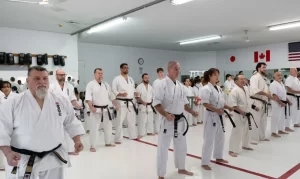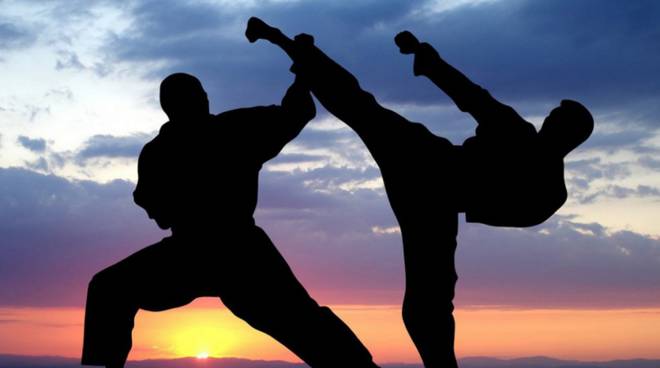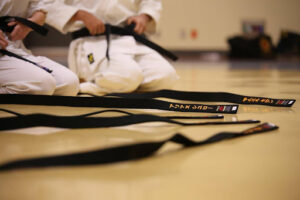
Impacts of Karate Training on Mental Health
Karate is a dynamic martial art that emphasizes both offensive and defensive techniques using the arms and legs. With a history spanning over a millennium,

Martial arts have long been recognized for their multifaceted benefits, extending beyond physical fitness to encompass mental and emotional well-being. In the realm of stress management, martial arts offer a holistic approach that integrates physical exertion, mindfulness, and self-discipline to cultivate resilience and promote a calmer life.
Let’s explore the role of martial arts in stress management and strategies for incorporating these ancient practices into modern-day living.
Engaging in martial arts involves dynamic movements, strength training, and cardiovascular exercise, all of which contribute to the release of endorphins – the body’s natural mood enhancers. Regular practice of martial arts not only strengthens muscles and improves flexibility but also serves as a powerful outlet for pent-up stress and tension. The rhythmic flow of movements in disciplines such as Tai Chi or Qigong promotes relaxation and mindfulness, allowing practitioners to channel their energy in constructive ways and alleviate stress-induced symptoms.
Central to many martial arts traditions is the cultivation of mindfulness – the practice of being fully present and aware in the moment. Through focused attention on breath control, body alignment, and movement sequences, practitioners develop heightened sensory awareness and mental clarity. This mindfulness extends beyond the training mat and into daily life, empowering individuals to approach challenges with greater composure and resilience. By integrating mindfulness techniques into martial arts practice, individuals can effectively manage stress triggers and maintain a sense of inner balance amidst life’s pressures.
Martial arts instills principles of self-discipline, self-control, and emotional regulation, providing practitioners with invaluable tools for managing stress and adversity. Through consistent practice and adherence to martial arts etiquette, individuals cultivate a sense of inner discipline and mastery over their thoughts and emotions. By learning to control impulses, manage frustration, and navigate conflict with equanimity, martial artists develop resilience and emotional intelligence – essential qualities for navigating life’s ups and downs with grace and resilience.
Participating in martial arts often involves belonging to a supportive community of fellow practitioners, instructors, and mentors. This sense of camaraderie and social support fosters a nurturing environment where individuals can share experiences, seek guidance, and draw inspiration from one another. The bond forged through martial arts transcends physical training and extends to mutual encouragement, accountability, and empathy, providing a vital support network for coping with stress and fostering personal growth.
To harness the stress-relieving benefits of martial arts in daily life, consider incorporating the following strategies:
Start with manageable goals and gradually progress as you build confidence and proficiency in your chosen martial art. Setting realistic and achievable milestones helps maintain motivation and ensures steady improvement without overwhelming yourself.
Consistency is key to reaping the benefits of martial arts practice. Set aside dedicated time each day or week for training, even if it’s just a few minutes of mindful movement. Creating a routine helps embed martial arts practice into your lifestyle, making it a natural part of your daily or weekly schedule.
Focus on the present moment during training sessions, paying attention to your breath, body sensations, and surroundings. Carry this mindfulness into everyday activities to cultivate a sense of calm and awareness. Practicing mindfulness not only enhances your martial arts experience but also improves your overall quality of life by reducing stress and increasing mental clarity.
Join a local martial arts studio or community group to connect with like-minded individuals and receive guidance from experienced instructors. Attending workshops, seminars, or retreats can deepen your understanding and practice of martial arts techniques and philosophy. Engaging with a community provides additional support, motivation, and opportunities for learning.
Approach martial arts practice with an open mind and a spirit of curiosity and exploration. Embrace challenges as opportunities for growth and learning, and celebrate your progress along the way. Recognize that martial arts is a lifelong journey of continuous improvement, where each step forward contributes to your personal development and well-being.
Incorporating martial arts principles such as respect, perseverance, and humility into your daily life can significantly enhance your personal and professional interactions. By embodying these values, you can navigate life’s challenges with greater resilience and composure.
Whenever you feel overwhelmed or stressed, utilize martial arts techniques such as deep breathing, meditation, or specific movements to regain composure. These practices can serve as immediate tools for managing stress and restoring balance in your life.
Experiment with different martial arts styles to find the one that resonates most with you. Whether it’s the fluid movements of Tai Chi, the dynamic kicks of Taekwondo, or the grappling techniques of Brazilian Jiu-Jitsu, each discipline offers unique benefits and can contribute to your overall well-being.
By incorporating martial arts into your life, you can tap into a rich tradition of physical, mental, and emotional cultivation that offers invaluable tools for managing stress and promoting overall well-being. Embracing martial arts practice provides a comprehensive approach to enhancing your quality of life, fostering resilience, and achieving inner harmony.

Karate is a dynamic martial art that emphasizes both offensive and defensive techniques using the arms and legs. With a history spanning over a millennium,

Robert F. Kennedy Jr. and the Role of Martial Arts in Wellness Robert F. Kennedy Jr., known for his commitment to health and wellness, is

Martial arts and self-defense have long been male-dominated, but women are increasingly taking up these disciplines for empowerment, fitness, and personal safety. As they challenge
| Tuesday | 12:00-6:30 |
| Wednesday | 12:00-5:15 |
| Thursday | 12:00-6:30 |
| Sunday | 10:00-12:00 |
Harmony By Karate Store is Now Live! View Our Brand New Products Dismiss

Please take the time to fill out this short pre-enrollment form. Once it is filled out and submitted you will be contacted by a member of the Harmony By Karate staff for a meeting.